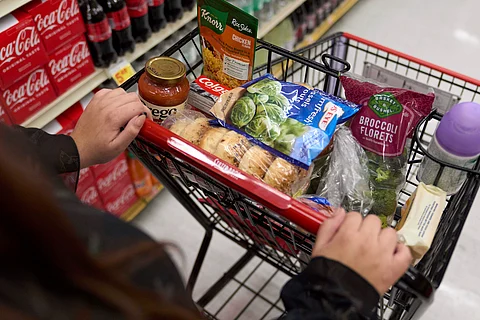
Despite food inflation in the UAE dropping sharply from 3.7% in early 2024 to just 0.36% by 2025, consumer anxiety about grocery prices remains high. New data reveals that 85% of UAE shoppers remain worried about inflation, driving a significant shift in purchasing behaviour towards budget stores, smaller basket sizes, and private-label brands.
UAE households are fundamentally changing their shopping patterns, with consumers buying fewer grocery items, switching to discount retailers, and delaying non-essential purchases even as price growth has stabilised dramatically.
According to the Blue Yonder 2025 Global Consumer Sentiment on Grocery Inflation Survey, which polled over 6,000 shoppers worldwide including the Middle East, inflation anxiety persists despite official figures showing price moderation. The survey found that 65% of consumers are purchasing fewer grocery items overall, while 42% have shifted to discount or wholesale stores.
Additional findings show that 36% actively chase promotions and 34% switch to private-label brands to reduce spending. Across Dubai and Abu Dhabi, retailers report that foot traffic now spikes strategically around price promotions, with customers adopting more deliberate purchasing strategies.
“Customers are far more selective,” said one Dubai supermarket operator. “They wait for the right deal before filling their trolleys.”
The UAE’s reliance on imported groceries—approximately 80% of agricultural products come from abroad, according to USDA data citing Euromonitor—leaves domestic prices vulnerable to global shipping costs, tariff fluctuations, and currency movements.
The Blue Yonder survey highlights that 49% of consumers blame tariffs for elevated grocery costs, while 42% cite rising raw material prices and 39% point to higher labour expenses in manufacturing and processing. In the Middle East specifically, tariffs are viewed as the primary culprit—a perception that influences both shopper behaviour and retailer pricing strategies.
To maintain stable grocery expenditure, households are cutting back in discretionary categories. The survey reveals that 56% have reduced spending on clothing and footwear, 46% on electronics, and 43% on streaming subscriptions. This reallocation reflects what retail analysts describe as a “new budgeting reality,” where essential goods take priority over luxury items.
Retailers offering consistent fair pricing, reliable stock, and transparent promotions are strengthening customer loyalty. Digital loyalty programmes have become central to shopping patterns, with nearly 79% of UAE consumers more likely to shop frequently if offered personalised promotions or discounts.
Online grocery shopping continues its rapid expansion, valued at $3.4 billion in 2024 and projected to grow fivefold by 2033. Many UAE shoppers now split purchases between physical stores and digital platforms, systematically tracking deals across both channels.
For UAE grocers, the message is unambiguous: price stability and consumer trust are non-negotiable. Retailers are responding by optimising supply chains, expanding private-label product ranges, and deploying AI-driven forecasting tools to predict demand, reduce waste, and maintain essential product availability.
The broader pattern suggests that while headline inflation has moderated substantially, its psychological impact continues to shape daily purchasing decisions. For UAE consumers, value perception now outweighs brand prestige—and for retailers, customer choice increasingly reflects a demand for transparency and genuine affordability.